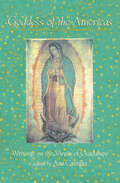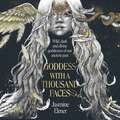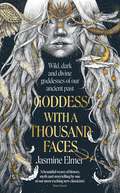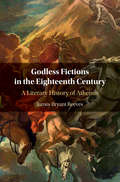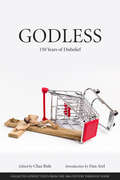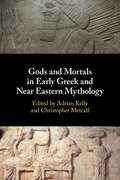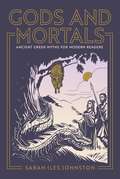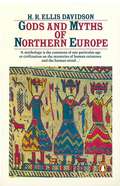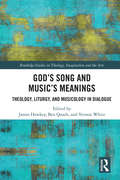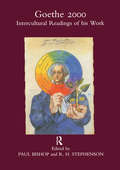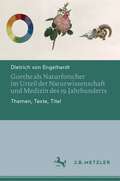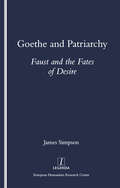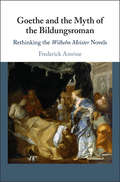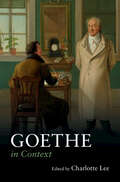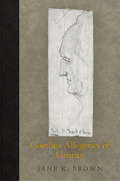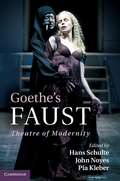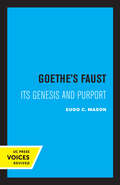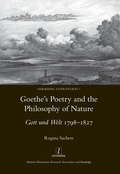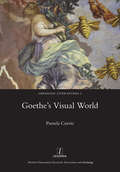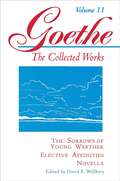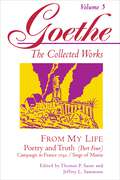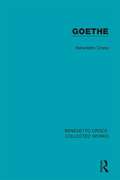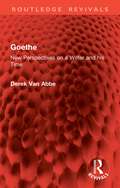- Table View
- List View
Goddess of the Americas: Writings on the Virgin of Guadalupe
by Ana CastilloGoddess of the Americas is a brilliant essay collection and an impassioned, unorthodox celebration of the Virgin of Guadalupe: mother goddess, patron saint of Mexico, protector of the downtrodden, who made her first appearance on American soil in 1531. Through a variety of forms -- original essays, historical writings, short fiction, drama, and poetry -- the illustrious contributors to this literary anthology examine the impact this potent deity, the Lady of Guadalupe, has had on the people and culture of Mexico, and her influence beyond that country, in Latin America, North America, and Europe.An unprecedented contribution to the literature of the Americas, Goddess of the Americas is an invigorating investigation, an idiosyncratic adoration, and a profound recognition of our need for the sacred, unwavering love of the mother goddess.Francisco Alarcon * Luis Alfaro * Gloria Anzaldua * Ronnie Burk * Rosario Castellanos * Ana Castillo * Denise Chavez * Sandra Cisneros * Felipe Ehrenberg * Clarissa Pinkola Estes * Rosario Ferre * Francisco Goldman * Guillermo Gomez-Pena * F. Gonzalez-Crussi * Nancy Mairs * Ruben Martinez * Pat Mora * Cherrie Moraga * Octavio Paz * Elena Poniatowska * Margaret Randall * Jeanette Rodriguez * Luis Rodriguez * Richard Rodriguez * Miriam Sagan * Luisah Teish * Liliana Valenzuela
Goddess with a Thousand Faces: A one-of-a-kind exploration of goddesses from our ancient past
by Jasmine Elmer'I loved Goddess with a Thousand Faces. Fascinating, fun and thoughtful and enlightening' JENNIFER SAINT'A beautiful weave of history, myth and storytelling by one of our most exciting new classicists' DAN SNOWSteeped in ancient magic, dark divinity and wild ways, Goddess with a Thousand Faces takes you on a historical journey like no other...Blending mythological retellings with historical research, Goddess with a Thousand Faces traverses the world and transports through time to bring ten formidable and inspiring ancient goddesses to life. Meet Artemis, the Greek goddess of the wilderness, never without her bow and arrow; Sedna, Inuit goddess of the ocean, guarding the icy waters and all its creatures; Isis, Egyptian goddess of healing, who dwells by the River Nile, just to name a few...Jasmine Elmer explores these goddesses of our past, uncovering their truths, their rebellion and their freedom. For too long, they have been written out of history; lost to the sands of time and stamped into silence. Goddess with a Thousand Faces restores these women to their glory. Pour over this treasure trove of myths, legends and mighty goddesses. Hear the messages echoing through the ages and see yourself in the faces of these icons. For while their stories might ancient, today they are more important - and more powerful - than ever.A treasure trove of beautiful storytelling and ancient wisdom, perfect for fans of Love in Colour by Bolu Babalola and Storyland by Amy Jeffs.'Gorgeous. Jasmine Elmer has a fierce passion for these women, and this shines through in her writing. Come for the goddesses, stay for the spiritual journey!' Lizzy Tiffin, author of Bad Girls of Ancient Greece'If you love history and feminist retellings, this is your next must-read. Goddess With a Thousand Faces is a thrilling exploration of lesser-known goddesses from around the world - offering a crash course in feminine myth and worship, with all its power, fury and wonder. I adored it' Rachel Blackmore, author of Costanza'A passionate ode to the inner goddess within us all, that blends a rich and vibrant introduction to a diverse array of cultures and mythologies with accessible retellings. Part mythical guide, part history compendium and part self-help handbook, Jasmine Elmer's sparkling debut offers up a refreshing, inclusive and powerfully feminist manifesto for what it means to be a goddess, ancient and modern' Emily Hauser, author of Mythica
Goddess with a Thousand Faces: A one-of-a-kind exploration of goddesses from our ancient past
by Jasmine Elmer'I loved Goddess with a Thousand Faces. Fascinating, fun and thoughtful and enlightening' JENNIFER SAINT'A beautiful weave of history, myth and storytelling by one of our most exciting new classicists' DAN SNOWSteeped in ancient magic, dark divinity and wild ways, Goddess with a Thousand Faces takes you on a historical journey like no other...Blending mythological retellings with historical research, Goddess with a Thousand Faces traverses the world and transports through time to bring ten formidable and inspiring ancient goddesses to life. Meet Artemis, the Greek goddess of the wilderness, never without her bow and arrow; Sedna, Inuit goddess of the ocean, guarding the icy waters and all its creatures; Isis, Egyptian goddess of healing, who dwells by the River Nile, just to name a few...Jasmine Elmer explores these goddesses of our past, uncovering their truths, their rebellion and their freedom. For too long, they have been written out of history; lost to the sands of time and stamped into silence. Goddess with a Thousand Faces restores these women to their glory. Pour over this treasure trove of myths, legends and mighty goddesses. Hear the messages echoing through the ages and see yourself in the faces of these icons. For while their stories might ancient, today they are more important - and more powerful - than ever.A treasure trove of beautiful storytelling and ancient wisdom, perfect for fans of Love in Colour by Bolu Babalola and Storyland by Amy Jeffs.'Gorgeous. Jasmine Elmer has a fierce passion for these women, and this shines through in her writing. Come for the goddesses, stay for the spiritual journey!' Lizzy Tiffin, author of Bad Girls of Ancient Greece'If you love history and feminist retellings, this is your next must-read. Goddess With a Thousand Faces is a thrilling exploration of lesser-known goddesses from around the world - offering a crash course in feminine myth and worship, with all its power, fury and wonder. I adored it' Rachel Blackmore, author of Costanza'A passionate ode to the inner goddess within us all, that blends a rich and vibrant introduction to a diverse array of cultures and mythologies with accessible retellings. Part mythical guide, part history compendium and part self-help handbook, Jasmine Elmer's sparkling debut offers up a refreshing, inclusive and powerfully feminist manifesto for what it means to be a goddess, ancient and modern' Emily Hauser, author of Mythica
Goddess with a Thousand Faces: A one-of-a-kind exploration of goddesses from our ancient past
by Jasmine Elmer'I loved Goddess with a Thousand Faces. Fascinating, fun and thoughtful and enlightening' JENNIFER SAINT'A beautiful weave of history, myth and storytelling by one of our most exciting new classicists' DAN SNOWSteeped in ancient magic, dark divinity and wild ways, Goddess with a Thousand Faces takes you on a historical journey like no other...Blending mythological retellings with historical research, Goddess with a Thousand Faces traverses the world and transports through time to bring ten formidable and inspiring ancient goddesses to life. Meet Artemis, the Greek goddess of the wilderness, never without her bow and arrow; Sedna, Inuit goddess of the ocean, guarding the icy waters and all its creatures; Isis, Egyptian goddess of healing, who dwells by the River Nile, just to name a few...Jasmine Elmer explores these goddesses of our past, uncovering their truths, their rebellion and their freedom. For too long, they have been written out of history; lost to the sands of time and stamped into silence. Goddess with a Thousand Faces restores these women to their glory. Pour over this treasure trove of myths, legends and mighty goddesses. Hear the messages echoing through the ages and see yourself in the faces of these icons. For while their stories might ancient, today they are more important - and more powerful - than ever.A treasure trove of beautiful storytelling and ancient wisdom, perfect for fans of Love in Colour by Bolu Babalola and Storyland by Amy Jeffs.'Gorgeous. Jasmine Elmer has a fierce passion for these women, and this shines through in her writing. Come for the goddesses, stay for the spiritual journey!' Lizzy Tiffin, author of Bad Girls of Ancient Greece'If you love history and feminist retellings, this is your next must-read. Goddess With a Thousand Faces is a thrilling exploration of lesser-known goddesses from around the world - offering a crash course in feminine myth and worship, with all its power, fury and wonder. I adored it' Rachel Blackmore, author of Costanza'A passionate ode to the inner goddess within us all, that blends a rich and vibrant introduction to a diverse array of cultures and mythologies with accessible retellings. Part mythical guide, part history compendium and part self-help handbook, Jasmine Elmer's sparkling debut offers up a refreshing, inclusive and powerfully feminist manifesto for what it means to be a goddess, ancient and modern' Emily Hauser, author of Mythica
Godless Fictions in the Eighteenth Century: A Literary History of Atheism
by James Bryant ReevesAlthough there were no self-avowed British atheists before the 1780s, authors including Jonathan Swift, Alexander Pope, Sarah Fielding, Phebe Gibbes, and William Cowper worried extensively about atheism's dystopian possibilities, and routinely represented atheists as being beyond the pale of human sympathy. Challenging traditional formulations of secularization that equate modernity with unbelief, Reeves reveals how reactions against atheism rather helped sustain various forms of religious belief throughout the Age of Enlightenment. He demonstrates that hostility to unbelief likewise produced various forms of religious ecumenicalism, with authors depicting non-Christian theists from around Britain's emerging empire as sympathetic allies in the fight against irreligion. Godless Fictions in the Eighteenth Century traces a literary history of atheism in eighteenth-century Britain for the first time, revealing a relationship between atheism and secularization far more fraught than has previously been supposed.
Godless: 150 Years of Disbelief
by Dan ArelGodless is a compilation of wide-ranging texts, both hilarious and horrifying, on atheism, belief, and religion. The selections in the book appeared in various formats from the late 19th century through the early 21st, and their authors were often active in the anarchist, Marxist, or radical leftist movements of their day. Derived from printed pamphlets, periodicals, and newspaper pieces that were mass-produced and widely distributed, these texts serve as freethinking propaganda in a media war against morbid authoritarian doctrines. With both a sophisticated analysis of inconsistencies in deistic beliefs and a biting satirical edge, Godless gives ammunition to those fighting fundamentalist bigotry—and more than a few reasons to abandon Christianity. Readers previously familiar with the authors' political polemics will be rewarded in contemplating another side of their remarkable literary output. Contributors include Emma Goldman, Ambrose Bierce, Chaz Bufe, E. Haldeman-Julius, Earl Lee, G. Richard Bozarth, Johann Most, Joseph McCabe, Matilda Gage, Pamela Sutter, S.C. Hitchcock, and Sébastien Faure.
Gods Gift of Language C: Writing and Grammar Work-Text
by Phyllis RandGods Gift of Language C: Writing and Grammar Work-Text, Third Edition by Phyllis Rand.
Gods and Mortals in Early Greek and Near Eastern Mythology
by Adrian Kelly Christopher MetcalfThis volume centres on one of the most important questions in the study of antiquity – the interaction between Greece and the Ancient Near East, from the Mycenaean to the Hellenistic periods. Focusing on the stories that the peoples of the eastern Mediterranean told about the gods and their relationships with humankind, the individual treatments draw together specialists from both fields, creating for the first time a truly interdisciplinary synthesis. Old cases are re-examined, new examples discussed, and the whole range of scholarly opinions, past and present, are analysed, critiqued, and contextualised. While direct textual comparisons still have something to show us, the methodologies advanced here turn their attention to deeper structures and wider dynamics of interaction and influence that respect the cultural autonomy and integrity of all the ancient participants.
Gods and Mortals: Ancient Greek Myths for Modern Readers
by Sarah Iles JohnstonAn entrancing new telling of ancient Greek myths“This book is a triumph! . . . [A] magnificent retelling of the Greek myths.”—Alexander McCall Smith, author of the No. 1 Ladies’ Detective Agency series“Move over, Edith Hamilton! Sarah Iles Johnston has hit the magical refresh button on Greek myths.”—Maria Tatar, author of The Heroine with 1001 FacesGripping tales that abound with fantastic characters and astonishing twists and turns, Greek myths confront what it means to be mortal in a world of powerful forces beyond human control. Little wonder that they continue to fascinate readers thousands of years after they were first told. Gods and Mortals is a major new telling of ancient Greek myths by one of the world’s preeminent experts. In a fresh, vibrant, and compelling style that draws readers into the lives of the characters, Sarah Iles Johnston offers new narrations of all the best-known tales as well as others that are seldom told, taking readers on an enthralling journey from the origin of the cosmos to the aftermath of the Trojan War.Some of the mortals in these stories are cursed by the gods, while luckier ones are blessed with resourcefulness and resilience. Gods transform themselves into animals, humans, and shimmering gold to visit the earth in disguise—where they sometimes transform offending mortals into new forms, too: a wolf, a spider, a craggy rock. Other mortals—both women and men—use their wits and strength to conquer the monsters created by the gods—gorgons, dragons, harpies, fire-breathing bulls.Featuring captivating original illustrations by Tristan Johnston, Gods and Mortals highlights the rich connections between the different characters and stories, draws attention to the often-overlooked perspectives of female characters, and stays true both to the tales and to the world in which ancient people lived. The result is an engaging and entertaining new take on the Greek myths.
Gods and Myths of Northern Europe
by H. DavidsonSurveys the pre-Christian beliefs of the Scandinavian and Germanic peoples. Provides an introduction to this subject, giving basic outlines to the sagas and stories, and helps identify the charachter traits of not only the well known but also the lesser gods of the age.
God’s Song and Music’s Meanings: Theology, Liturgy, and Musicology in Dialogue (Routledge Studies in Theology, Imagination and the Arts)
by Vernon White James Hawkey Ben QuashTaking seriously the practice and not just the theory of music, this ground-breaking collection of essays establishes a new standard for the interdisciplinary conversation between theology, musicology, and liturgical studies. The public making of music in our society happens more often in the context of chapels, churches, and cathedrals than anywhere else. The command to sing and make music to God makes music an essential part of the DNA of Christian worship. The book’s three main parts address questions about the history, the performative contexts, and the nature of music. Its opening four chapters traces how accounts of music and its relation to God, the cosmos, and the human person have changed dramatically through Western history, from the patristic period through medieval, Reformation and modern times. A second section examines the role of music in worship, and asks what—if anything—makes a piece of music suitable for religious use. The final part of the book shows how the serious discussion of music opens onto considerations of time, tradition, ontology, anthropology, providence, and the nature of God. A pioneering set of explorations by a distinguished group of international scholars, this book will be of interest to anyone interested in Christianity’s long relationship with music, including those working in the fields of theology, musicology, and liturgical studies.
Goethe 2000: Intercultural Readings of His Work
by Paul Bishop"The two-hundred-and-fiftieth anniversary of the birth of Johann Wolfgang von Goethe was celebrated in Scotland by a colloquium held under the auspices of the University of Glasgow's Centre for Intercultural Germanistics in April 1999. Its aim was to reflect both Goethe's own commitment to Weltliteratur and the pressing need in our global village at the turn of the millennium for cultural exchange between scholars of different nations. For if, as Goethe said, 'wer fremde Sprachen nicht kennt, weis nichts von seiner eigenen', then it is also true that 'wer fremde Kulturen nicht kennt; weis nichts von seiner eigenen'.Discussing different themes, different texts, and working with different methodological presuppositions, the papers in this collection nevertheless share the conviction that the significance of Goethe for the new millennium can best be shown by setting his works in an intercultural context. The volume also includes John Michael Krois' Inaugural Ernst Cassirer Lecture in Intercultural Relations, held in the University of Glasgow in April 2000, entitled 'Ernst Cassirer and the Renaissance of Cultural Theory'."
Goethe als Naturforscher im Urteil der Naturwissenschaft und Medizin des 19. Jahrhunderts: Themen, Texte, Titel
by Dietrich von EngelhardtGoethe als Naturforscher findet bei deutschen und ausländischen Naturforschern und Medizinern des 19. Jahrhunderts durchgängig Beachtung und führt zu einer Fülle spezifischer Goethe in dieser Hinsicht gewidmeten Studien mit Interpretationen und Beurteilungen – neben wiederholt vorkommenden knapperen Ausführungen oder kurzen Hinweisen in naturwissenschaftlichen und medizinischen Publikationen der Zeit. Übergreifende Veröffentlichungen über Goethe und die Romantik, über seine Stellung in Europa, über seine Beziehungen zu England, Frankreich, Italien, Spanien, den skandinavischen und slavischen Ländern behandeln meist nur seine literarischen und geisteswissenschaftlichen Werke und gehen allenfalls begrenzt auf seine naturwissenschaftlichen Beiträge und ihre Aufnahme in den Naturwissenschaften und Medizin ein. Diese fachspezifische Zurückhaltung gilt auch für Bibliographien der Übersetzungen deutscher Veröffentlichungen des 19. Jahrhunderts in europäische Sprachen; naturwissenschaftliche und medizinische Publikationen kommen in ihnen nicht oder nur sporadisch vor. Der vorliegende Band schließt diese Lücke. Neben einer umfassenden Bibliographie von 260 Titeln von Naturwissenschaftlern und Medizinern über Goethe als Naturforscher steht eine Wiedergabe von 48 entsprechenden nicht nur deutschen, sondern vor allem auch internationalen und oft an entlegenen Orten erschienenen Arbeiten.
Goethe and Patriarchy: Faust and the Fates of Desire
by James Simpson"This book traces the history of a complex sexual fantasy which features recurrently in Goethe's writings from his days as a student in Leipzig to the final years as Europe's most celebrated living poet. Simpson shows how the young man's fantasy of innocent sexuality became an increasingly troubled one during the poet's first decade in Weimar. Goethe began to recognize in it a submerged element: the incestuous roots of desire. Triggered by this discovery, Goethe's imagination becomes increasingly analytic and diagnostic, and startlingly prefigures the work of Freud. Yet, paradoxically, Goethe's insight leads him to a triumphant reassertion of an innocent sexuality purged of those elements he identifies as 'diseased'. Central to ""Goethe and Patriarchy"" is a new account of the genesis of the first part of ""Faust"", which is shown to contain a record of Goethe's changing attitudes to human sexuality. In particular, Simpson is the first critic to demonstrate that the Gretchen episode is a deliberate ""Kontrafaktur"" of the patriarchal idyll of the ""Song of Songs"". The book explores numerous other Goethe texts and casts entirely new light on his creative imagination."
Goethe and the Myth of the Bildungsroman: Rethinking the Wilhelm Meister Novels
by Frederick AmrineGoethe's Willhelm Meister novels, widely held to be the most significant and influential in all of German literature, have traditionally been classed as Bildungsroman, or 'novels of formation'. In Goethe and the Myth of Bildungsroman, Frederick Amrine offers a unique reading of Wilhelm Meister's Lehrjahre and Wilhelm Meister's Wanderjahre, which posits the second novel as a sequel to the first. Deconstructing and jettisoning the notion of the Bildungsroman, the features of the novels which have historically proved problematic for critics, seeming to testify to the novels' disunity, become instead the articulation points of a subtle concord between thematic and formal elements. Reading the novels in light of the eminent criticism of Northrop Frye, this book productively shifts away from social commentary towards the archetypal and symbolic, showing Goethe not to be an exception within world literature; rather, that he participates deeply in its overarching structures.
Goethe in Context (Literature in Context)
by Charlotte LeeOne of the most prolific and versatile writers of all time, Johann Wolfgang Goethe (1749–1832) made an impact that continues to extend far beyond his native Germany. The variety of human questions and experiences treated in his works is arguably without parallel. He also had (for his era) an unusually long life, which spanned the French Revolution, the end of the Holy Roman Empire and subsequent reshaping of the German-speaking world, and the rapid onset of industrial modernity. In thirty-seven short essays, leading international scholars explore Goethe's life and times, his literary works, his activity in the realms of art, philosophy and natural science, his reception of – and indeed by – other cultures, and, finally, the resonance of his work in our time. The aim of this collection is to open as many windows as possible onto Goethe's wide-ranging intellectual and practical activity, and to give a sense of his ongoing importance.
Goethe's Allegories of Identity
by Jane K. BrownA century before psychoanalytic discourse codified a scientific language to describe the landscape of the mind, Johann Wolfgang von Goethe explored the paradoxes of an interior self separate from a conscious self. Though long acknowledged by the developers of depth psychology and by its historians, Goethe's literary rendering of interiority has not been the subject of detailed analysis in itself. Goethe's Allegories of Identity examines how Goethe created the essential bridge between the psychological insights of his contemporary, Jean-Jacques Rousseau, and the psychoanalytic theories of his admirer Sigmund Freud.Equally fascinated and repelled by Rousseau's vision of an unconscious self, Goethe struggled with the moral question of subjectivity: what is the relation of conscience to consciousness? To explore this inner conflict through language, Goethe developed a unique mode of allegorical representation that modernized the long tradition of dramatic personification in European drama. Jane K. Brown's deft, focused readings of Goethe's major dramas and novels, from The Sorrows of Young Werther to Elective Affinities, reveal each text's engagement with the concept of a subconscious or unconscious psyche whose workings are largely inaccessible to the rational mind. As Brown demonstrates, Goethe's representational strategies fashioned a language of subjectivity that deeply influenced the conceptions of important twentieth-century thinkers such as Freud, Michel Foucault, and Hannah Arendt.
Goethe's Faust
by Pia Kleber Hans Schulte John NoyesFaust has been called the fundamental icon of Western culture, and Goethe's inexhaustible poetic drama is the centrepiece of its tradition in literature, music and art. In recent years, this play has experienced something of a renaissance, with a surge of studies, theatre productions, press coverage and public discussions. Reflecting this renewed interest, leading Goethe scholars in this volume explore the play's striking modernity within its theatrical framework. The chapters present new aspects such as the virtuality of Faust, the music drama, the modernization of evil, Faust's blindness, the gay Mephistopheles, classic beauty and horror as phantasmagoria, and Goethe's anticipation of modern science, economics and ecology. The book contains an illustrated section on Faust in modern performance, with contributions by renowned directors, critics and dramaturges, and a major interview with Peter Stein, director of the uncut 'millennium production' of Expo 2000.
Goethe's Faust: Its Genesis and Purport
by Eudo C. MasonThis title is part of UC Press's Voices Revived program, which commemorates University of California Press’s mission to seek out and cultivate the brightest minds and give them voice, reach, and impact. Drawing on a backlist dating to 1893, Voices Revived makes high-quality, peer-reviewed scholarship accessible once again using print-on-demand technology. This title was originally published in 1967.
Goethe's Poetry and the Philosophy of Nature: Gott Und Welt 1798-1827
by Regina SachersAt the beginning of the nineteenth century, philosophy and theology come under increasing pressure owing to the emergence of the modern sciences. The collection Gott und Welt is Goethe's poetic contribution to this conflict, in which an alternative to orthodox Christianity was being sought. Following the collection's various stages of composition and publication, this study offers new readings of some of Goethe's best known poems: 'Die Metamorphose der Pflanzen', 'Dauer im Wechsel', 'Urworte. Orphisch' and 'Wiederfinden'. Sachers shows that Gott und Welt is the long poem on nature which Goethe attempted to write for the last third of his life. As such it represents Goethe's unique answers to the intellectual challenges posed by the dawning age of science. Regina Sachers is Lecturer in German at Exeter College, Oxford.
Goethe's Visual World
by Pamela CurrieGoethe's ideas on colour and imagery crossed many borderlines: those of artistic processes and philosophical aesthetics, art history and colour theory, together with the science of perception. This investigation into his writings ranges across art from Antiquity, the Renaissance and the eighteenth century, as well as exploring the centrality of these issues to Goethe's literary work. Questions find answers, but also raise new questions. This systematic sequence of essays, originally written between 1999 and 2011, appeals to readers in all these separate areas, while drawing together their essential coherence.
Goethe, Volume 11: The Sorrows Of Young Werther--elective Affinities--novella
by Judith Ryan David E. Welbery Victor Lange Johann Wolfgang von GoetheContaining three of Goethe's major prose works, this volume explores a range of themes: unfulfilled love, infidelity, divorce, tragic love, fantasy, and moral rebirth. One of Goethe's best known works, The Sorrows of Young Werther, explores the extremes of the subjective experience through the novel's depiction of a sensitive young man caught up in a love impossible to fulfill. In Elective Affinities, a novel of tragic love, Goethe employs all the requisites of sentimental romance to give a deeply ironic perspective to the idea of love. As the title indicates, Novella examines the possibilities inherent in this genre.
Goethe, Volume 5: From My Life: Campaign in France 1792-Siege of Mainz
by Johann Wolfgang von GoetheAn authoritative English translation of Goethe&’s classic autobiographical account of war and conquest in the age of revolutionIn August 1792, Goethe accompanied Karl August, Grand Duke of Saxe-Weimar-Eisenach, during the Prusso-Austrian invasion of revolutionary France to restore Louis XVI as king. After the Cannonade of Valmy that September, the German armies were forced to retreat, never again to threaten the heart of France until the end of the Napoleonic era. The French subsequently invaded the Rhineland and captured the city of Mainz, claiming it for the French Republic. When German armies besieged Mainz, Goethe witnessed the capture of the city at the close of 1793.Goethe&’s narrative of these events has become a classic text for the history of Franco-German relations during the revolutionary period. A product of recollection, historical hindsight, and considerable study of other published sources, it is a fascinating document of the military catastrophe exposing the decline of Prussian power since the death of Frederick II, which eventually culminated in Napoleon&’s devastating 1806 victory at Jena and Auerstedt.
Goethe: Con Una Scelta Delle Liriche Nuovamente Tradotte (classic Reprint) (Collected Works)
by Benedetto CroceCroce admired Goethe partly because the latter possessed a knowledge of human nature in all its aspects but nonetheless kept his mind above and beyond political sympathies and the quarrels of nations. In this volume originally published in English in 1923, Croce distils his critical ideas about Goethe with the aim of helping readers to better understand the German poet’s work.
Goethe: New Perspectives on a Writer and his Time (Routledge Revivals)
by Derek Van AbbeFirst published in 1972, Goethe presents a biography looking at one of the few great Europeans to be universally recognized as a hero of culture, and in the light of modern sociological thought puts the hero into his background, human, social and political. Goethe is seen in the context of his times- not as the Great Poet or the Great Lover but as the worried contemporary of the French Revolution and Napoleon. The author is much more interested than most biographers in the mature Goethe and the problems of the poet’s old age. This stems from his intense preoccupation with Goethe’s friend and biographer Eckermann, whose Conversations (for which Eckermann is ranked by many with Boswell) he is re-editing.This is an interesting read for scholars of German language & literature and European literature.
